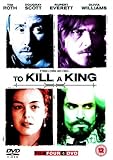Eye For Film >> Movies >> To Kill A King (2003) Film Review
To Kill A King
Reviewed by: Jennie Kermode
To Kill a King is an unusually bold and blunt attempt to recount events during a critical period in English history. That it takes a few liberties with the truth is only to be expected; these happen mostly in order to compact important matters into a shorter timeframe, and we encounter no infuriating historical deviations.
Other recent historical movies have sought to sell themselves as comedies or glamorous romances. This is a film about friendship and assorted forms of love, but it avoids being overly simplistic. It is also unabashedly political, and shows politics as a complex business, making good cases for several different positions.
This hinges on a career-best performance by Rupert Everett as King Charles I. His speeches about the necessity of deferring to the rule of law and about the dangers of democracy are deeply unfashionable in today's political climate as they were in the 1600s, yet he lends them a pathos and quiet authority which really make the audience stop and think. His Charles is a saddened and sometimes frightened man doing his best to hold on in desperate times; this helps to make modern audiences aware of the enormity, in that age, of the crime of regicide.
Despite all this, To Kill A King is far from perfect. Though well-paced in the first half, it does begin to drag later on; it's difficult to maintain tension when covering a series of events with no simple climax or conclusion. Dougray Scott is passable but bland as General Thomas Fairfax; and whilst Olivia Williams turns in a forceful performance as his wife Anne, it's hard to imagine that Emily Watson, first choice for the role, could not have been more evocative and subtle.
It was a great stroke of luck, however, that Ewan McGregor declined the part of Cromwell, as this is the sort of part which Tim Roth was born to play. Though we see Cromwell mostly in his early days, when he was passionate and visionary, committed to doing good, Roth also gives us glimpses of the monster which this man was to become. His is perhaps the most sympathetic screen Cromwell yet, but he's no less brutal for it, and his decline is piteous to watch.
This story centres on the (largely imagined) relationship between Cromwell and Fairfax, telling a tale of a friendship destroyed by war and shifting ideologies. The position of Anne in all this is unclear, but there's a potent homosexual subtext focusing on Cromwell's jealousy and his awareness that Fairfax's handsome face is also the one the people want for their leader.
Though its ugly battle scenes and fabulous costumes are really nothing new, To Kill a King does have a strong sense of place (and period), especially as we see increasing numbers of puritans exerting their influence politically and socially. It's not hugely exciting or revelatory, but it's a good, solid little film aware of its own limits, and it deserves respect for that.
Reviewed on: 27 Jun 2007




















